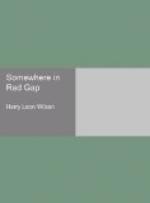By unspoken agreement we drew rein to survey a desolation that was still immaculate. Stables and outbuildings were trim and new, and pure with paint. All had been swept and garnished; no unsightly litter marred the scene. The house was a suburban villa of marked pretension and would have excited no comment on Long Island. In this valley of the mountains it was nothing short of spectacular. Only one item of decoration hinted an attempt to adapt itself to environment: in the noble stone chimney that reared itself between two spacious wings a branding iron had been embedded. Thus did it proclaim itself to the incredulous hills as a ranch house.
Flowers had been planted along a gravelled walk. While I reminded myself that the gravel must have been imported from a spot at least ten miles distant, I was further shocked by discovering a most improbable golf green, in gloomy survival. Then I detected a series of kennels facing a wired dog run. This was overwhelming in a country of simple, steadfast devotion to the rearing of cattle for market.
Ma Pettengill now spoke in a tone that, for her, could be called hushed, though it reached me twenty feet away.
“An art bungalow!” she said, and gazed upon it with seeming awe. Then she waved a quirt to indicate this and the painfully neat outbuildings. “A toy for the idle rich—was that it? Well, you said something. This was one little per-diem going concern, all right. They even had the name somewhere round here worked out in yellow flowers—Broadmoor it was. You could read it for five miles when the posies got up. There it is over on that lawn. You can’t read it now because the letters are all overgrown. My Chinaman got delirious about that when he first seen it and wanted me to plant Arrowhead out in front of our house, and was quite hurt when I told him I was just a business woman—and a tired business woman at that. He done what he could, though, to show we was some class. The first time these folks come over to our place to lunch he picked all my pink carnations to make a mat on the table, and spelled out Arrowhead round it in ripe olives, with a neat frame of celery inclosing same. Yes, sir!”
This was too much. It now seemed time to ask questions, and I did so in a winning manner; but so deaf in her backward musing was the woman that I saw it must all come in its own way.
“We got to make up over that bench yet,” she said at last; and we rode out past the ideal stable—its natty weather vane forever pointing the wind to the profit of no man—through another gate of superb cunning, and so once more to an understandable landscape, where sane cattle grazed. Here I threw off the depression that comes upon one in places where our humankind so plainly have been and are not. Again I questioned of Broadmoor and its vanished people.




